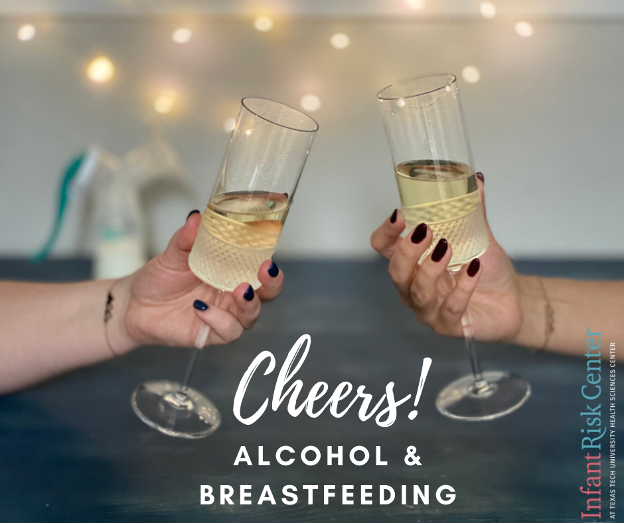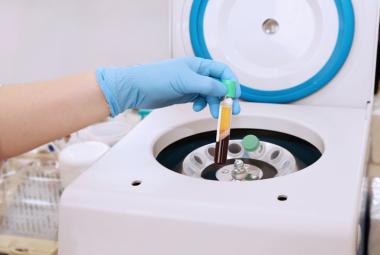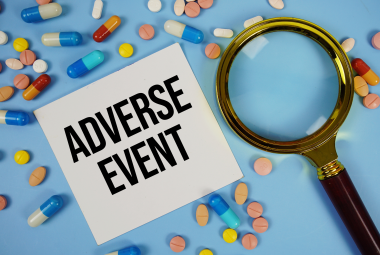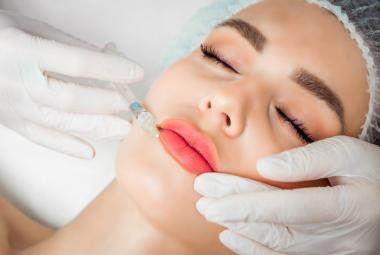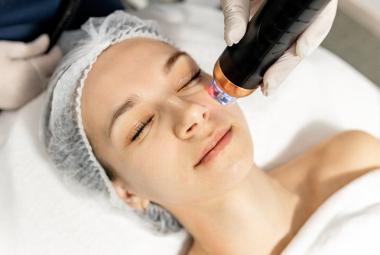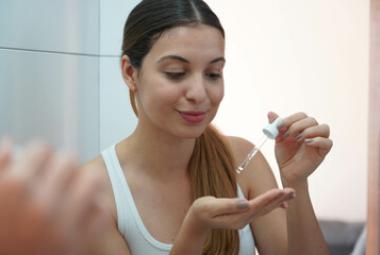The sun is setting, baby is safe and sound with their grandparents, and it’s time for you to get your first night out in months. After more than nine months of abstaining, you can finally have that first post-pregnancy drink. But at the end of the night when it’s time to feed your child, what should you do if you’ve had a glass of wine? Or more?
The Background
The dangers of drinking alcohol during pregnancy are well known, but many new mothers find little direction on how to safely consume alcoholic drinks while breastfeeding. Many organizations recommend not drinking at all (it is the safest option). But if an occasional drink stands between you and continued breastfeeding, there are safe ways to compromise and still reap the benefits of breastfeeding for baby (and you!). A safe path to alcohol consumption while breastfeeding requires some planning. Alcohol direct impacts your ability to nurse by inhibiting oxytocin, a hormone responsible for milk let-down.1 When nursing mothers drink, they may find themselves unable to release milk until blood alcohol levels decrease. Once the alcohol is gone, they can express milk again. Because milk had extra time to build up, some moms may even feel as though their milk supply has increased. However, alcohol is also a diuretic that can cause dehydration…which can decrease milk volume. Ultimately, this may disrupt feeding schedules for infants. There are some claims that beer can increase milk supply, but so far there isn't any evidence to support that claim.
How does alcohol get into milk?
Alcohol in the blood transfers into breast milk, so the concentration of alcohol present in human milk can be estimated by the Blood Alcohol Concentration (BAC—you may have heard of this from a breathalyzer). Once absorbed into the bloodstream, alcohol moves back and forth between the milk and the blood to find an equal balance.2 Alcohol is broken down by the liver, where it is metabolized to components naturally found in your body until no alcohol remains. At the same time, alcohol leaves the milk as well to keep that equal balance. This means there is no need to “pump and dump” after drinking if you wait for the alcohol to be out of your blood. In fact, pumping and dumping before you burn off the alcohol doesn’t work.3 New milk will still have alcohol in it until all the alcohol is gone from your blood.
So how long does it take to be safe?
It depends. Scientists have looked at this exact question (yay science!). Usually, the standard rule is 2 hours for every standard drink.4 But each person’s body works a little differently. The best predictors they found are your weight and how many drinks you’ve had. Keep in mind, not all drinks are equal. In the US, a “standard drink” is defined as containing 14 grams of alcohol (see below for examples). Many common drinks contain much more alcohol than the standard. Be sure to use how many standard drinks you’ve had in the calculator…not the number of actual drinks. Need help with this? NIAAA can help you figure it out here.
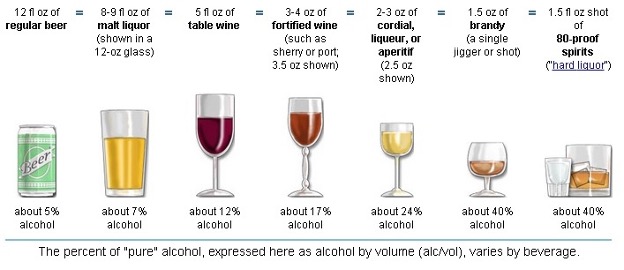
At the InfantRisk Center, we recommend that after moderate drinking you can return to breastfeeding as soon as you feel neurologically normal. However, we know this makes many moms uncomfortable. To find out how long it will take your body to eliminate drinks from breastmilk, use this calculator backed by real research to estimate how long it will take for there to be NO alcohol in your milk—your time-to-zero.
Calculate your “Time to Zero”
What if I can’t wait that long?
Unfortunately, even though you know you are off duty for the night your breasts don’t get that memo. Pumping right before you drink will give you the longest amount of time to wait comfortably. If you have more than 1 or 2 drinks, your breasts will probably get uncomfortably full while waiting for your alcohol levels to go down. Engorgement can lead to problems like mastitis, so we recommend pumping for comfort but not using the alcohol-contaminated milk for feedings. No one wants to throw out that precious liquid gold…but moms have found plenty of resourceful ways to repurpose it. You’ve probably heard claims that human milk can be used to treat many ailments. Most aren’t backed by science (yet), but it isn’t likely to be harmful either. Some online retailers can even turn milk into jewelry for a lifelong keepsake.
Don’t have a breast pump, or forgot to bring one with you? Manual expression might take a minute to get the hang of, but it’s very effective. All you need is your hands.
Some other tips:
Blood Alcohol Concentration (and therefore your milk) usually reaches its peak 30-60 minutes after drinking.5 Drinking alcohol with food may reduce overall alcohol absorption and drinking slowly over time with increased water intake reduces BAC. Many home remedies found online for “sobering up”, like exercising or taking cold showers, do not lower BAC and will not reduce alcohol levels in breast milk. Giving your body enough time to break down alcohol is the best way to lower BAC.
How does an occasional drink affect breastfeeding?
We know a lot about the harmful effects of maternal alcohol consumption on a developing child in the womb. However, less is known about low levels of alcohol exposure in breastfed infants. Feeding immediately after drinking will likely cause mild agitation and disrupted sleep patterns6 at a minimum—it’s not a good idea. The calculator on this page can show you how long after drinking until the alcohol concentration in your milk returns to zero.
What would chronic, heavy alcohol consumption do to my baby?
Long-term data suggest that infants raised to mothers who are chronic heavy drinkers (>2 drinks per day) have hormonal imbalances, are more sedated, and may have lowered academic success compared to their peers in childhood. However, it is unclear if this is a direct effect of alcohol concentration in breast milk or if other factors in childcare and during pregnancy lead to this outcome. One case study found that a woman drinking approximately 50 cans of beer per week among other alcoholic beverages breastfed her infant, and at 4 months of age the infant developed a metabolic disorder caused by chronically increased stress hormones.7 It was resolved after the mother quit drinking. Other case studies report problems with excessive bleeding8, unarousable sleep, and decreased growth in infants whose mothers breastfed after chronic alcohol use.
A Message from the InfantRisk Center:
Breastfeeding is hard. We know moms fight to continue their breastfeeding journey—against sleep, against pain, and against fear. At the InfantRisk Center, we want to encourage and empower moms to keep you breastfeeding while keeping baby safe. Our resources include our app, MommyMeds to lookup prescription and Over-the-Counter drugs for breastfeeding safety, and a nurse-staffed call line for your support. Don’t forget: breastfeeding isn’t just good for your baby’s health, it’s great for you too.
Kori Adair, 4th year Pharmacy Student
Kaytlin Krutsch, PharmD, MBA, BCPS
References
- Cobo E, Quintero CA. Milk-ejecting and antidiuretic activities under neurohypophyseal inhibition with alcohol and water overload. Am J Obstet Gynecol. Nov 15 1969;105(6):877-87. doi:10.1016/0002-9378(69)90094-5
- Pepino MY, Steinmeyer AL, Mennella JA. Lactational State Modifies Alcohol Pharmacokinetics in Women. Alcoholism: Clinical and Experimental Research. 2007;31(6):909-918. doi:10.1111/j.1530-0277.2007.00387.x
- Centers for Disease Control and Prevention. Breastfeeding: alcohol. https://www.cdc.gov/breastfeeding/breastfeeding-special-circumstances/v…. Accessed October 27, 2021.
- Ho E, Collantes A, Kapur BM, Moretti M, Koren G. Alcohol and breast feeding: calculation of time to zero level in milk. Biol Neonate. 2001;80(3):219-22. doi:10.1159/000047146
- Drugs and Lactation Database (LactMed) [Internet]. Bethesda (MD): National Library of Medicine (US); 2006-. Alcohol. [Updated 2021 May 17]. Available from: https://www.ncbi.nlm.nih.gov/books/NBK501469/.
- Mennella JA, Beauchamp GK. The transfer of alcohol to human milk. Effects on flavor and the infant's behavior. N Engl J Med. Oct 3 1991;325(14):981-5. doi:10.1056/nejm199110033251401
- Binkiewicz A, Robinson MJ, Senior B. Pseudo-Cushing syndrome caused by alcohol in breast milk. J Pediatr. Dec 1978;93(6):965-7. doi:10.1016/s0022-3476(78)81220-7
- Hoh TK. Severe hypoprothrombinaemic bleeding in the breast fed young infants. Singapore Med J. Mar 1969;10(1):43-9.
- Gibson L, Porter M. Alcohol and Tobacco use While Breastfeeding and Risk of Autism Spectrum Disorder or Attention Deficit/Hyperactivity Disorder. Journal of Autism and Developmental Disorders. 2021;doi:10.1007/s10803-021-05027-3

